|
|
|
Sort Order |
|
|
|
Items / Page
|
|
|
|
|
|
|
| Srl | Item |
| 1 |
ID:
175154


|
|
|
|
|
| Summary/Abstract |
Some scholars in International Relations and comparative politics continue to debate how to obtain the strongest explanatory theory whereas others hold that each approach should be treated as its own area of research. Both of these groups tend to agree that factors from across paradigms cannot be coherently combined with each other. On the contrary, Sil and Katzenstein have argued for analytic eclecticism in scholarship, which would not treat research traditions or paradigms as strict limitations on theory construction. Inspired by pragmatism, they have made a compelling case that considerations of usefulness and knowledge cumulation are more important than paradigmatic fidelity. This forum examines analytic eclecticism from the points of view of neo-empiricism, feminism, and interpretive constructivism, followed by a reply by Sil. A decade has passed since the publication of Sil and Katzenstein’s Beyond Paradigms, so it seems appropriate to reflect upon the strengths and weaknesses of analytic eclecticism.
|
|
|
|
|
|
|
|
|
|
|
|
|
|
|
|
| 2 |
ID:
175158
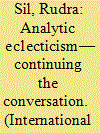

|
|
|
|
|
| Summary/Abstract |
In this response to the contributions in this symposium, I approach the above articles not as wholesale critiques requiring point-by-point rebuttal but as constructive engagements that require clarification or invite further reflection as part of an ongoing conversation. In some instances, I revisit and elaborate upon the main motivations and assumptions that Peter Katzenstein and I had in mind as we sought to lay out the significance of analytic eclecticism for different audiences. At other times, I take it upon myself to consider aspects of our approach that might be updated or reframed in light of concerns raised by some of the authors. I specifically address four issues that have been raised: the core logic of analytic eclecticism and its operationalization with respect to once-dominant paradigms in International Relations; the link between complexity, causality, and constitutive logics; the status of metatheory and the links between eclecticism and pragmatism; and the relationship between scholarly debates and “real-world” issues of policy and ethics. Whether the response is satisfactory or not, it is worth bearing in mind that, for Peter Katzenstein and myself, analytic eclecticism was always meant to be more of an ethos than a method or manifesto; that ethos long predates our published work and is evident in the thoughtful contributions that constitute this symposium.
|
|
|
|
|
|
|
|
|
|
|
|
|
|
|
|
| 3 |
ID:
185524
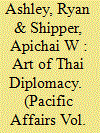

|
|
|
|
|
| Summary/Abstract |
This paper argues that a pragmatist theory of international relations, combined with parables of alliance formation from local proverbs and literary classics, best explains the art of Thai diplomacy from a historical perspective. Notably avoiding Western colonization, the Thais have enjoyed relative sovereignty and independence throughout their history. Rather than balancing, bandwagoning, or hedging, our study finds that Thailand has deliberately leveraged asymmetrical partnerships between often-opposed great powers and more symmetrical partnerships with less powerful states and multilateral organizations in order to maintain its physical and identity-based ontological security. We draw our empirical evidence from four historical periods: the nineteenth and early twentieth centuries, World War II, the Cold War, and the post-Cold War modern era. Our findings can be applied to other Southeast Asian states and their own parables of alliance.
|
|
|
|
|
|
|
|
|
|
|
|
|
|
|
|
| 4 |
ID:
121651
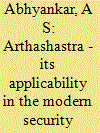

|
|
|
| 5 |
ID:
113252
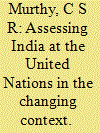

|
|
|
|
|
| Publication |
2010.
|
| Summary/Abstract |
The United Nations (UN) has been a useful instrument for India not only in pursuing its foreign policy goals effectively, but also for the progressive and peaceful transformation of the global political system. The changing priorities of the country's political leadership, the challenge of reconciling subjective interests with objective principles, the nuanced pursuit of non-alignment and sensitivity to the existing international system have historically worked as factors to create a mix of effects in India's performance in the world body. In the intricate agenda of the new century, India's participation highlights concerns on reinforcing the core strengths of the UN in managing non-traditional security threats, including transnational terrorism, mobilizing collective action in the era of globalization for minimizing the economic inequities, both within and between countries, and lastly revitalization of the UN structures including, in particular, the Security Council's composition through comprehensive reforms by common agreement. As for future strategy, the hope of replaying its past leadership role may be a less appropriate and acceptable option than building pragmatic and issue-based partnerships with all relevant countries in multilateral negotiation settings.
|
|
|
|
|
|
|
|
|
|
|
|
|
|
|
|
| 6 |
ID:
117915
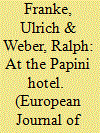

|
|
|
|
|
| Publication |
2012.
|
| Summary/Abstract |
Pragmatism is ever more popular amongst those who study international relations. Its emphasis on practice is generally acknowledged as a defining characteristic. There is, however, a general tension within pragmatist thought concerning practice, for pragmatism may emphasize the theorizing of practice. It is, then, distinguished from other theories in International Relations (IR) such as neo-realism or constructivism as a contender in their midst. We delineate a pragmatist theory of IR in the first part of this article, but insist on going beyond merely establishing the next paradigm, for pragmatism may also emphasize the practice of theorizing. Theories are, then, considered different tools useful for dealing with the social world. This will be corroborated in the second part by a close reading of William James. Finally, we submit that instead of a paradigm war, a metaphor such as that of the Papini hotel is needed in IR - a metaphor that accounts for theory competition without neglecting the limitations set by the practice of theorizing itself.
|
|
|
|
|
|
|
|
|
|
|
|
|
|
|
|
| 7 |
ID:
186919
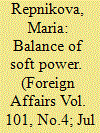

|
|
|
| 8 |
ID:
126156
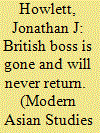

|
|
|
|
|
| Publication |
2013.
|
| Summary/Abstract |
In May 1949 the Chinese Communist Party seized Shanghai. Rather than being elated at the prospect of harnessing the economic power of China's largest city to complete the revolution, the Communists approached it cautiously. How would the Chinese Communist Party set about transforming this free-wheeling port city with a 'semi-colonial' past into an orderly and socialist city? How would it balance ideology and pragmatism in reshaping Shanghai? This paper uses the takeover of two British companies as case studies to explore these issues at the ground level. It is argued that the means by which these companies were transformed tell us much about the Party and its state-building policies. When cadres entered foreign companies, their priority was not radical change and anti-imperialism, but rather fostering a sense of stability and unity to avoid disrupting production. Their gradual approach was due in large part to the Party's awareness of its own limited skills, resources and manpower, but also to its leaders and cadres recognizing that before they could remake Shanghai anew they had first to deal with the material and human legacies of the past.
|
|
|
|
|
|
|
|
|
|
|
|
|
|
|
|
| 9 |
ID:
129693
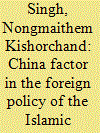

|
|
|
|
|
| Publication |
2014.
|
| Summary/Abstract |
The Islamic Republic of Iran has been the centre of global push and pull because of its geostrategic position and its engagement with other regional and international actors. And the controversy over Iran's foreign policy is as old as the Islamic public itself. The debate over its clandestine nuclear program and dispute with the west continue to dominate world headlines. In order to gain a better understanding of Iran, it is important to analyze its foreign policy through which one can access its position in the regional and international affairs.
|
|
|
|
|
|
|
|
|
|
|
|
|
|
|
|
| 10 |
ID:
164366
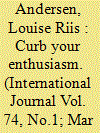

|
|
|
|
|
| Summary/Abstract |
The future looks post-Western. But will it also be post-liberal? To gauge how and by whom liberal internationalism may be sustained in the coming order, the article provides a critical and historically grounded analysis of the role of the United Nations in the fading US-led order and the ordering potential and role of middle powers. The article suggests that in the current interregnum of global governance the conventional distinction between traditional and emerging middle powers is increasingly unhelpful. What matters is not their past history, but their present proclivity for seeking multilateral, negotiated solutions. It is this pragmatic version of liberal internationalism that may have a future in a post-Western world, and open up a more pluralist, inclusive approach to global governance.
|
|
|
|
|
|
|
|
|
|
|
|
|
|
|
|
| 11 |
ID:
173753
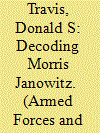

|
|
|
|
|
| Summary/Abstract |
The American sociologist Morris Janowitz presented two world views of security named “absolutist” and “pragmatist.” This dualistic paradigm endures into the 21st century and explains how complex and contentious security options are debated within the U.S. security establishment. His paradigm also reveals a condition called the “hegemon trap,” which means that the more powerful militarily that a state becomes relative to other states, the less likely it will fight a large-scale conventional war, resulting in frequent and perpetual limited, low-intensity, and unconventional wars. Based on experiences learned since the Vietnam War, the United States can improve global security by balancing resources between absolutist and pragmatist outlooks. This requires devoting a greater share of resources toward peacetime engagement, stability operations, and unconventional warfare.
|
|
|
|
|
|
|
|
|
|
|
|
|
|
|
|
| 12 |
ID:
065875
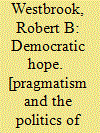

|
|
|
|
|
| Publication |
Ithaca, Cornell University Press, 2005.
|
| Description |
xvi, 246p.
|
| Contents |
Peircean politics--Our kinsman, William James--Pullman and the professor--On the private parts of a public philosopher--Marrying Marxism--A dream country--Democratic logic--Democratic evasions--Educating citizens.
|
| Standard Number |
9780801428333
|
|
|
|
|
|
|
|
|
|
|
|
Copies: C:1/I:0,R:0,Q:0
Circulation
| Accession# | Call# | Current Location | Status | Policy | Location |
| 050174 | 144.30973/WES 050174 | Main | On Shelf | General | |
|
|
|
|
| 13 |
ID:
114085
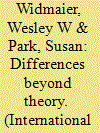

|
|
|
|
|
| Publication |
2012.
|
| Summary/Abstract |
Over the past two decades, one of the main themes in IR theory debates has been a concern for the interplay of agents, structures, and change. In this article, we engage with these debates as they pertain to "the state of the art" by highlighting in broad fashion three "constructivist turns" and their implications for efforts to explain the rise and demise of norms. More specifically, we offer a stylized history of a debate marked by shifting emphases on structural constraints, strategic practices, and sentimental forces. In the context of this symposium, while we accept many of our colleagues' critiques of extant scholarship, we draw on the work of Richard Rorty to argue that the most important differences pertain to matters "beyond theory," regarding the effects of norms in enabling the establishment of either an open community or disciplinary society.
|
|
|
|
|
|
|
|
|
|
|
|
|
|
|
|
| 14 |
ID:
175157
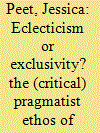

|
|
|
|
|
| Summary/Abstract |
Eclecticism in International Relations (IR) claims to reject the rigid boundaries set by various theoretical traditions, yet, in practice, it falls short of moving the field “beyond paradigms” and tends to produce analytical exclusivity rather than eclecticism. This exclusivity is the result of Sil and Katzenstein’s investment in tenets of American pragmatism. These tenets favor consensus and universalism, leading to the reproduction and exclusivity of the theoretical status quo. Dissolving paradigmatic boundaries requires a more critical form of pragmatism. Drawing on the common origins of feminism and pragmatism paired with the contemporary feminist concept of intersectionality, this essay proposes a critical pragmatist ethos and an intersectional analytic eclecticism. This can produce a more inclusive form of analytic eclecticism and render visible the power dynamics that shape experiences as well as academic scholarship. Only when analytic eclecticism is informed by intersectionality and a critical pragmatism might it actually move IR “beyond paradigms.”
|
|
|
|
|
|
|
|
|
|
|
|
|
|
|
|
| 15 |
ID:
153910
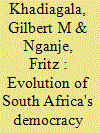

|
|
|
|
|
| Summary/Abstract |
South Africa is an emerging power with fairly strong democratic institutions that were crafted during the transition from minority to majority rule twenty years ago. How has South Africa used its position and power to promote democracy in Africa? Against the backdrop of debates on democracy promotion by emerging powers, this article probes attempts by successive post-apartheid governments to promote democracy in Africa. We argue that although democracy promotion featured prominently in South Africa's policy towards Africa in the immediate post-apartheid period under Nelson Mandela, the administrations of Thabo Mbeki and Jacob Zuma faltered in advancing democratic norms. This is largely because South Africa has confronted pressures to maximize pragmatic national interests, which have compromised a democratic ethos in a continental environment where these values have yet to find steady footing.
|
|
|
|
|
|
|
|
|
|
|
|
|
|
|
|
| 16 |
ID:
085761
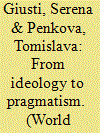

|
|
|
|
|
| Summary/Abstract |
Russia has replaced the ideological guidelines of its Soviet days by pragmatic nationalism as post-imperial nuclear power striving to reassert its influence mostly by economic and cultural means. Furthermore, Russia is well poised to face crucial issues such as terrorism, pollution, high prices of commodities, energy supplies, etc. The Russia-West relationship is definitely not a zero-sum game, as in the past. Instead both parties can benefit from a fair dialogue
|
|
|
|
|
|
|
|
|
|
|
|
|
|
|
|
| 17 |
ID:
196214


|
|
|
|
|
| Summary/Abstract |
Although United Nations peace missions have played an important conflict management role for decades, a backlash against the post-Cold War model of ‘liberal peacebuilding’ and other recent developments have called their future into doubt. Some observers contend that a ‘pragmatic turn’ is now underway—a shift away from ambitious plans to transform war-torn societies into liberal democracies and towards more modest and realistic goals. Whether ‘pragmatism’ offers a viable alternative framework for peacebuilding, however, is less clear. This article challenges key assumptions of the pragmatic approach to peacebuilding, including the notion that UN missions can be ‘agnostic’ about the governance arrangements of societies that host these operations, as some proponents of pragmatism recommend. Historical case-studies show that such assumptions are integral features of collective conflict management systems, including UN peace missions. Moreover, a close examination of the pragmatist approach reveals that it, too, is based on such assumptions—namely, that building peace requires the promotion of pluralist societies and states. Pluralist peacebuilding, the article concludes, could offer a compelling foundation for future UN missions in an era of rising statist–authoritarianism, but developing this approach will first require discarding pragmatism's pretence of ideological agnosticism.
|
|
|
|
|
|
|
|
|
|
|
|
|
|
|
|
| 18 |
ID:
116793
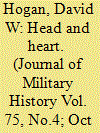

|
|
|
|
|
| Publication |
2011.
|
| Summary/Abstract |
In recent years, Afghanistan and Iraq have drawn new attention to an old subject: American attitudes toward warfare. This essay surveys the existing literature to approach this problem through the interlocking factors of reason and feeling. At first, Americans reconciled these factors, and justified their wars, because republicanism, romantic nationalism, and Victorian culture created the comforting sense of a chosen nation in an orderly, moral cosmos. When two world wars and the Great Depression produced modernist doubt, Americans used nationalism, pragmatism, and faith in technology to guide and sustain them. By the late twentieth century, however, modernist challenges to old universals in a larger and more pluralistic society became harder to reconcile as debates over wars polarized along emotional extremes, while reason's proponents clung to a precarious middle ground. Currently, the prospect of a revived consensus appears remote.
|
|
|
|
|
|
|
|
|
|
|
|
|
|
|
|
| 19 |
ID:
167734
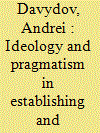

|
|
|
|
|
| Summary/Abstract |
This is a review of the main stages of rapprochement and improvement of relations between China and the U.S. after a long period of alienation and enmity. An attempt has been made to analyze the correlation of pragmatic and ideological motivations in the process of this rapprochement, which culminated in 1979 in the establishment of diplomatic relations between the United States of America and the People's Republic of China. The U.S.-Chinese differences at the present stage are characterized and future development prospects are briefly analyzed.
|
|
|
|
|
|
|
|
|
|
|
|
|
|
|
|
| 20 |
ID:
174381
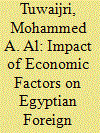

|
|
|
|
|
| Summary/Abstract |
This article attempts to further theoretical and empirical understanding of the extent to which the economic factor had been critical in determining the Egyptian foreign policy between 1978 and 2010. While the following 32 years recorded major shifts in Egypt’s domestic, regional and international affairs, the larger parameters of its foreign policy were forged in the 1970s when specific economic pressures largely determined in which direction Cairo would move. Thus, this analysis seeks to substantiate the argument that the primacy of the domestic sphere has remained recurrent. It also is contended that while economy may have been the catalyst of major foreign policy shifts in Egypt, it was indeed regime security that was—and remains—the primary determinant of the Egyptian foreign policy. The article, hence, concludes that Egypt’s foreign policy was thus determined by economic factors only to the extent that it did not endanger the security of the regime.
|
|
|
|
|
|
|
|
|
|
|
|
|
|
|
|
|
|
|
|
|